ARTS & CULTURE
The Cost Of Widowhood In Igboland Is Very High
Published
7 months agoon
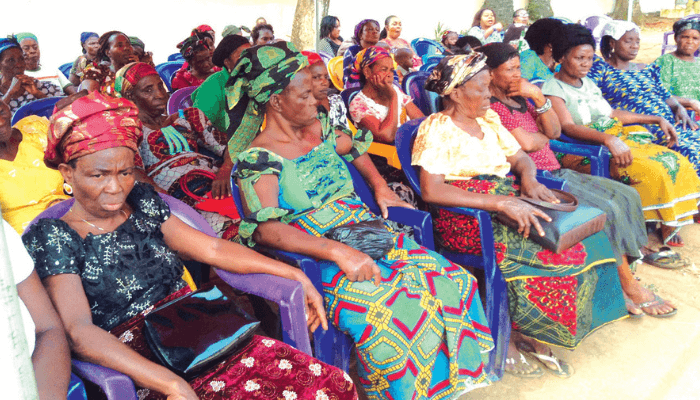
In some parts of Igbo land, there used to be customs about how widows mourned their husbands. These practices, which could involve periods of seclusion, weren’t always easy for women. That is why many people would refer to it as “the cost of widowhood.”
In some places, like Nimbo in Enugu State, it could take a whole year after a king’s burial for his wife to start living normally again. In Anambra, widows might spend nearly two years secluded and even go without bathing for long periods.
Thankfully, things have changed in many areas thanks to the spread of Christianity. Now, it’s more common for widows to be shaved soon after their husband’s funeral and then get back to their lives after a period of mourning. The length of that time can vary depending on the local customs and traditions of the people.
It’s important to remember that these customs aren’t practised everywhere in Igbo land, and even where they are, they may have changed over time. Today, the focus is on supporting widows through their grief and helping them reintegrate into their communities.
Let’s take a look at the following Eastern states and what “the cost of widowhood” is like in these places:
Anambra
In some communities in Anambra, to ease tensions over widowhood practices, certain measures have been adopted. For instance, in communities where a man leaves multiple wives, rather than the late man’s brothers scrambling for them, each male child of their mothers gives a cock to his own mother to act as “her husband” until death. This has reduced tensions over the late brother’s wives.
However, a contentious issue persists between the church and the community regarding the dust-to-dust burial rite. In the Catholic Diocese of Awka, objections arise when women are required to pour sand into the graves of their husbands, as per church tradition.
The community fears that this act may bind the widow to the late husband, potentially leading to consequences for any man involved with the widow. Despite interventions, the disagreement persists.
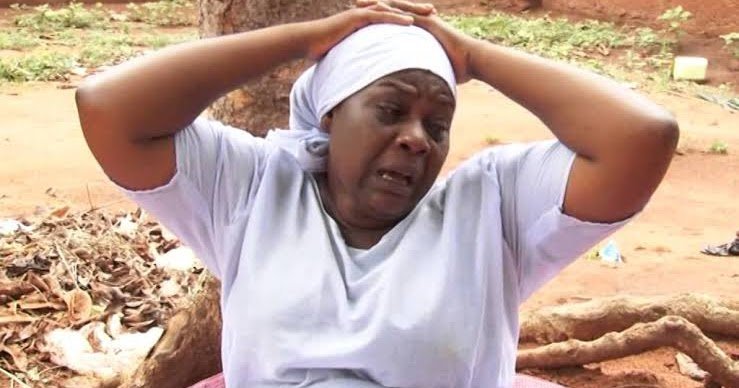
The Catholic Church insists that the dust-to-dust ritual is optional and not forced on anyone, only for Catholic adherents who request it. The community contends that the church is violating local customs, and the church argues for its right to perform the rite at the request of its members.
In Onitsha and neighbouring communities, widowhood practices for Christians and non-Christians have similarities. The mandatory mourning period, wake-keeping, and lying-in-state have been reduced or abolished in some places to minimise contact with the deceased’s remains, curb disease spread, and ease the hardships faced by survivors.
Cases of maltreatment of widows, including denial of rights, physical assault, and property seizure, persist in some areas of this state. These issues are typically resolved through the intervention of family unions, kindred, village councils, or town unions.
Prevention of widows from participating in burial ceremonies
In some places, if a wife and husband weren’t living together due to big fights, divorce, or other bad things before the husband died, she might not be allowed at his funeral ceremony.
This can also happen if the wife is blamed for doing something terrible and needs to go through special rituals before joining the ceremony.
Oath-taking and covenant
In some communities, if a woman is accused of wrongdoing, especially related to her husband’s death, she might be asked to perform rituals or take oaths to prove her innocence.
For Christian women, this might involve swearing to the Bible. For others, it could involve drinking water used to bathe the corpse or even touching the body directly.
These practices are based on the belief that if a woman is truly guilty, she will suffer misfortune or even die within a certain time. If she remains unharmed, she’s considered innocent, and those who accused her might face consequences.
It’s important to remember that these traditions are complex and vary greatly within different communities. This is just a simplified explanation, and it’s important to respect different cultural beliefs and practices, even if they seem unfamiliar.
Also, it’s crucial to note that these practices can be harmful and exploitative, especially when they involve coercion, pressure, or potential health risks. It’s important to promote understanding and respect while also advocating for the protection of individuals from harmful traditional practices.
Abia
Life for widows in Abia can be tough. Though the mourning period has shortened to 3-6 months in most communities, accessing their husband’s property remains a big issue. Many are pushed out of their homes or denied inheritance.
Churches like the Anglican Communion, through Bishop Nwosu, strongly condemn this maltreatment and offer support through housing, prayers, and even business grants for vulnerable widows.
For this, men are advised to choose legal marriages, where Wills protect inheritance rights. However, Abia currently lacks a specific law protecting widows.
Get the latest and greatest updates right away! Join our exclusive WhatsApp channel and never miss out on exciting news again.
![Young widow shares the 'inhumane' treatment she was subjected to after losing her husband at 23 [VIDEO] - BarristerNG.com](https://i0.wp.com/barristerng.com/wp-content/uploads/2022/09/young-widow-750x375-1.jpg?fit=750%2C375&ssl=1)
Enugu
In Enugu, mourning traditions for widows vary greatly across communities. Some practices have softened over time, reflecting changing beliefs and the influence of Christianity.
In Imufu Community, men and women mourn for only one month, thanks to the progressive leadership of a former chief who challenged the longer periods common elsewhere.
Ezeagu Local Government Area is where widows of prestigious “Ozo” title holders face stricter customs. They’re confined to secret rooms for two weeks, served by female virgins, and undergo cleansing rituals before rejoining the community.
In the Nimbo Community, it is a unique case. Nimbo buries its kings after seven years, leading to extended mourning periods for their widows, who remain secluded for eight years.
While some areas like Nimbo hold firmly to tradition, Christianity has brought changes in others. Black mourning attire has shifted to white in many communities, and mourning periods have shortened. In Olo, even the “Ozo” tradition has adapted to Christian values.
Some communities are addressing the exploitation of widows. Town Unions work to uphold social justice, protecting widows from property grabs based on outdated customs.
While progress is evident, challenges remain. Widows in Ibagwa Ani are still pressured to marry relatives of their deceased husbands, and Lejja sees mourning periods ranging from six months to a year.
The story of widows in Enugu highlights the complex interplay of tradition, religion, and evolving social values. While harmful practices persist in some areas, others demonstrate a commendable willingness to adapt and prioritize the well-being of widows.
Imo
The widowhood practice in the southeastern part of Nigeria, particularly in Imo State, is still prevalent and has become more sophisticated and severe over time. The tradition originated from historical practices and was often imposed on women suspected of causing their husband’s death. It served as a severe punishment for women perceived as irresponsible, wayward, or disrespectful to their husbands, families, or community traditions.
In some cases, even if a man had a harmonious relationship with his wife, people might still claim that the woman used diabolical means to control her late husband, adding a bizarre aspect to the practice. The belief is that no man is considered to have died a natural death; some factors are always linked to his demise.
The absence of a written constitution specifying the rules and limits of the practice results in variations across communities in Imo State.
Common practices include forcing widows to bathe with floodwater, water from traditional receptacles, or any available dirty water. This is done to symbolize the devaluation of the woman’s pride, represented by her late husband. Married and single women are typically responsible for carrying out this ritual.
Widows are also subjected to eating restrictions, using disused or disfigured plastic plates considered suitable for feeding dogs. They are prohibited from eating with others, and their cutlery differs from those used by everyone else. These practices contribute to the complexity and harshness of the widowhood tradition in the region.
For more articles on culture, check here.
You may like
-


5 Powerful Goddesses Who Answer Prayers In Nigerian Traditional Religions
-


I Wanted To Celebrate My Culture – Chike On His New Album
-


Why Is Kano State The Divorce Capital Of Nigeria?
-


Why ‘Isiagu’ Styles Are Becoming Norm At Igbo Ceremonies
-
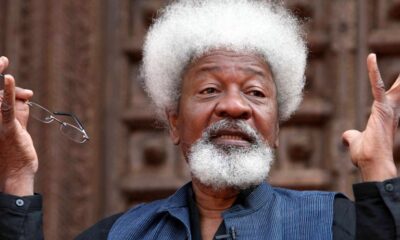

Adopt July 13 As Wole Soyinka Day – Alake Urges Federal Government
-
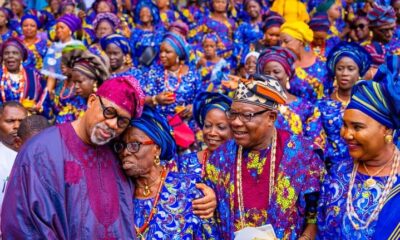

FG To List Ojude Oba As UNESCO Approved Festival
ARTS & CULTURE
Babatunde Apalowo’s ‘Londoner’ Wins Best Fiction Feature Prize At Durban FilmMart
Published
2 days agoon
July 25, 2024By
Reporter
“Londoner” is an autobiographical film that tells the story of Ayo, a Nigerian bank manager who moves to London to reunite with his family. The film, written and directed by Babatunde Apalowo, recently achieved recognition at the Durban FilmMart. It won the Red Sea Film Fund Award for Best Fiction Feature. This prestigious award came with a cash prize of $5,000.
The Durban FilmMart Institute, which organized the event, is a non-profit organization dedicated to promoting both local and international trade and investment in African film content. This institute plays a crucial role in showcasing and supporting African filmmakers and their projects.
Babatunde Apalowo, the creative force behind “Londoner,” is a Nigerian film director and screenwriter who has made the United Kingdom his base. His portfolio includes several notable works such as “A Place for Happiness,” “Catcher,” “The Millions,” and “Death for Sale.” Apalowo’s talent received international recognition in 2023 when he won the Teddy Award at the Berlin Film Festival for his queer romance film titled “All the Colours of the World Are Between Black and White.”
The 15th edition of the Durban FilmMart, held in South Africa from July 19 to July 22, served as a platform for numerous impressive film projects from across the African continent. It was during this event that “Londoner” received its accolade.
Babatunde Apalowo
Produced by Pamela Drameh and Sarudzayi Marufu, “Londoner” goes into the complex emotions of its protagonist, Ayo. The film follows Ayo’s journey as he arrives in London, expecting to join his family, only to face an unexpected and heartbreaking situation. He discovers that his wife has become emotionally involved with another man and is seeking a divorce, adding a layer of personal turmoil to his already challenging experience of relocating to a new country.
The narrative of “Londoner” draws inspiration from Apalowo’s own experiences as an immigrant in the UK.
The director’s struggle to find a sense of belonging in a foreign land forms the emotional core of the film. In an interview with Variety, Apalowo shared his personal insights, highlighting the stark contrast between Nigeria and London in terms of personal space and social interactions. He poignantly described the loneliness he felt in London, a city where the anonymity and indifference of urban life stood in stark contrast to the close-knit communities he was accustomed to in Nigeria.
“Londoner” marks Apalowo’s second venture into feature filmmaking, showcasing his growth as a director and his ability to translate personal experiences into compelling cinematic narratives. The film’s success at the Durban FilmMart not only recognizes Apalowo’s talent but also brings attention to the important themes of migration, cultural adjustment, and personal relationships that the film explores.
The Durban FilmMart also celebrated other talented filmmakers. Among them were Sean Drummond and Sheetal Magan, who received The Known Inner Circle Award for their South African film “Acts of Man.” This award came with a substantial cash prize of $10,000, further demonstrating the event’s commitment to supporting and promoting African cinema.
ARTS & CULTURE
5 Powerful Goddesses Who Answer Prayers In Nigerian Traditional Religions
Published
7 days agoon
July 20, 2024
Nigerian traditional religions are rich with powerful deities, many of whom are female (goddesses). These goddesses play crucial roles in the spiritual lives of their devotees, answering prayers and providing guidance.
Here, we’ll explore some of the most prominent goddesses in Nigerian traditional religions. Also, we would highlight their domains of influence and how they answer the prayers offered to them.
1. Oshun: The Goddess of Love, Beauty, and Prosperity
Oshun, revered primarily in the Yoruba religion, is a captivating and multifaceted goddess. She embodies beauty, love, sensuality, fertility, and prosperity. Often depicted as a woman adorned with golden jewellery and flowing robes, Oshun is associated with the Niger River, a symbol of life and abundance.
Devotees pray to Oshun for:
- Love and marriage: Singles seeking love and couples desiring a harmonious relationship turn to Oshun. They offer prayers for finding a compatible partner, strengthening existing relationships, and overcoming relationship challenges.
- Fertility and children: Women wishing to conceive often seek Oshun’s blessings. These women pray for a healthy pregnancy, childbirth, and raising happy children.
- Prosperity and wealth: Oshun is believed to bring good fortune and financial success. Entrepreneurs and those seeking financial stability pray to her for blessings in their endeavours.
2. Yemoja: The Powerful Mother of the Waters
Yemoja, another Yoruba goddess, reigns over the oceans, rivers, and all bodies of water. She is a powerful protector, especially for women, children, and those travelling on water. Yemoja is often depicted as a fierce yet nurturing mother figure, dressed in blue and adorned with coral beads.

The worshippers pray to Yemoja for:
- Protection and safe travel: Those embarking on journeys, especially by sea, pray to Yemoja for safe passage and a smooth return.
- Healing and wellness: Believers believe Yemoja heals, especially women’s health issues. They offer prayers for recovery from illness, childbirth complications, and emotional well-being.
- Blessings for mothers and children: Mothers pray to Yemoja for the well-being of their children, and women struggling with infertility seek her blessings for conception.
3. Aladura: The Earth Goddess of Abundance
In Igbo cosmology, Aladura represents the powerful earth goddess. The people associate Aladura with fertility, agriculture, and the bounty of the harvest. They also see Aladura as the life-giving force behind nature’s bounty.
Devotees pray to Aladura for:
- Fertile land and abundant harvest: Farmers and those working the land pray for Aladura’s blessings on their crops, ensuring a bountiful harvest and food security.
- Prosperity and wealth: Aladura is also associated with material wealth derived from the land. People in business ventures related to agriculture or natural resources pray to her for success.
- Health and well-being: A healthy, thriving harvest is believed to bring health and well-being to the community. Prayers are offered to Aladura for good health and the overall prosperity of the people.
4. Oya: The Powerful Warrior Queen
Oya, a prominent Yoruba goddess, embodies the forces of wind, storms, and change. She is a fierce warrior queen, often depicted wielding powerful winds and lightning. Despite her fierce nature, the believers associate Oya with fertility, the marketplace, and ancestral spirits.
Devotees pray to Oya for:
- Strength and courage: Those facing challenges or needing strength to overcome obstacles pray to Oya for her warrior spirit.
- Transformation and change: Oya represents change and transformation. People facing major life transitions pray for her guidance and support during these times.
- Prosperity in business: As the goddess of the marketplace, its believers believe Oja brings success in business ventures. Entrepreneurs pray to her for a thriving business and protection from rivals.
5. Aje: The Spirit of Wealth and Prosperity
Aje, a pan-Nigerian spirit, represents wealth, prosperity, and good fortune. She is not a single, defined deity but rather a spirit that can manifest in various forms, often associated with crossroads and marketplaces.
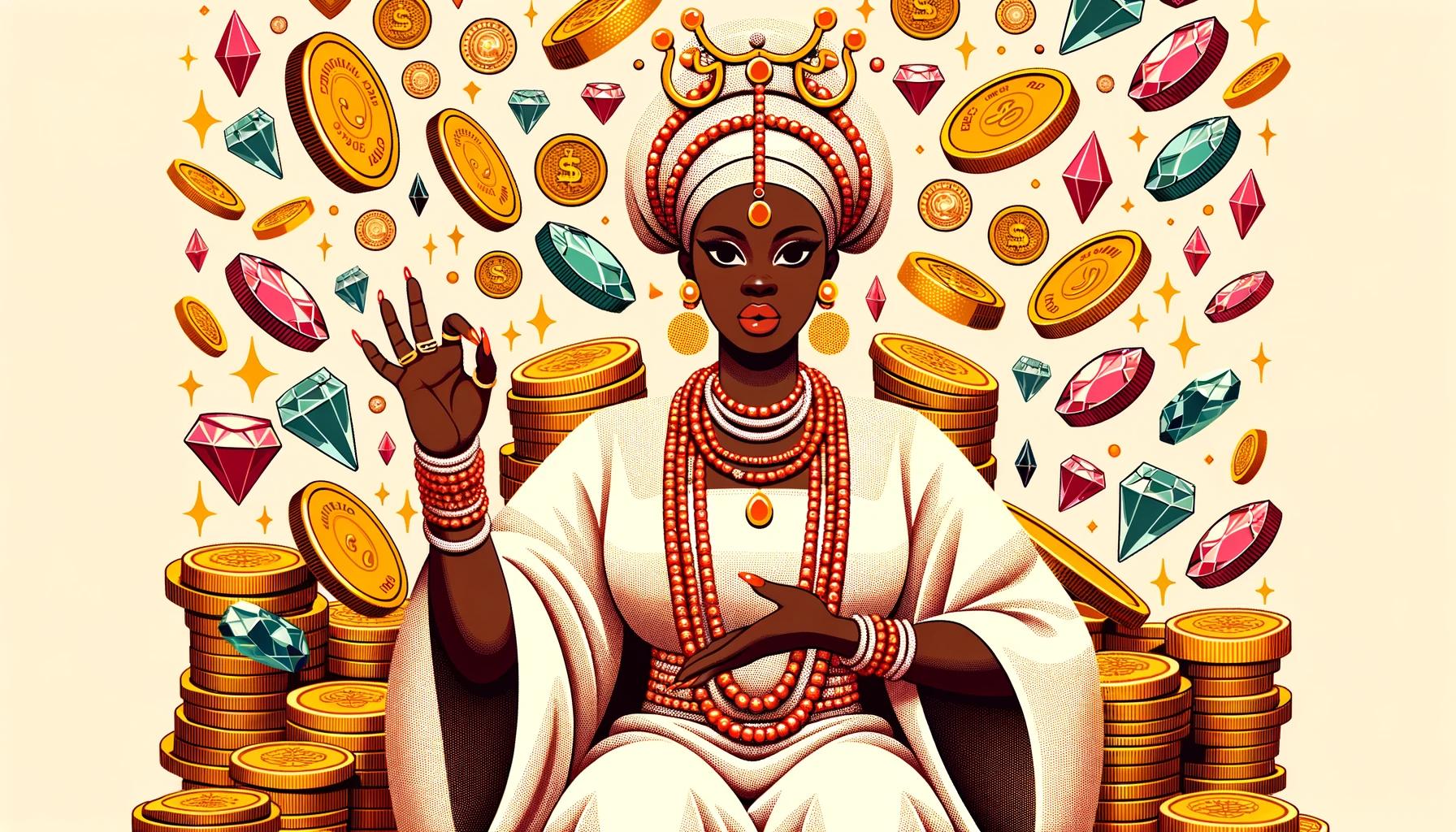
Devotees pray to Aje for:
- Financial success: Those seeking financial stability, increased income, or success in business ventures call upon Aje’s blessings.
- Debt repayment: Facing financial difficulties or struggling with debt? People pray to Aje for assistance in overcoming financial burdens.
For more articles on culture, visit here.
ARTS & CULTURE
Why Is Kano State The Divorce Capital Of Nigeria?
Published
2 weeks agoon
July 13, 2024
Kano State has gained notoriety as the “divorce capital” of Nigeria due to its alarmingly high rates of marital dissolution. This phenomenon has attracted attention from sociologists, policymakers, and the media.
Let’s explore the factors contributing to this situation based on available research and reports:
According to various reports, Kano State consistently records some of the highest divorce rates in Nigeria. The Kano State Hisbah Board, which handles marital issues among Muslims, reported processing over 80,000 divorce cases between 2020 and 2021 alone. These numbers are significantly higher than those reported in other Nigerian states.
1. Cultural and Religious Factors
Kano State is predominantly Muslim, and Islamic law allows for relatively easy divorce proceedings. Under Islamic law, a man can divorce his wife by simply pronouncing “talaq” (divorce) three times. This ease of divorce can contribute to higher rates of marital dissolution.
2. Economic Pressures
Economic hardship is often cited as a major factor in Kano’s high divorce rates. Many couples struggle to meet basic needs, leading to stress and conflicts within marriages. The economic downturn in Nigeria has hit Kano particularly hard, exacerbating these issues.
3. Early Marriages
Child marriage is still practised in parts of northern Nigeria, including Kano State. These early marriages often lead to divorce as young couples struggle with the responsibilities of married life and may grow apart as they mature.
4. Lack of Marital Education
Many couples in Kano enter into marriage without adequate preparation or understanding of marital responsibilities. This lack of premarital counselling and education can lead to misunderstandings and conflicts that ultimately result in divorce.
5. Polygamy
While polygamy is accepted in Islamic law, it can create tensions within families. Disputes between co-wives or feelings of neglect can lead to divorce, particularly if the husband struggles to treat all wives equally as required by Islamic teachings.
6. Changing Social Norms
As more women in Kano gain education and economic independence, they may be less willing to tolerate unhappy marriages. This shift in social dynamics can contribute to higher divorce rates as women feel more empowered to leave unsatisfactory relationships.
8. Lack of Conflict Resolution Skills
Many couples lack the necessary skills to resolve conflicts effectively. Without proper communication and problem-solving abilities, minor disagreements can escalate into irreconcilable differences.
While Kano’s situation is complex and influenced by multiple factors, it highlights the need for comprehensive approaches to strengthen marriages and support families. This includes addressing economic challenges, providing better marital education, promoting gender equality, and offering accessible counselling services.
As Kano State grapples with its reputation as Nigeria’s divorce capital, continued research and targeted interventions will be crucial in understanding and addressing this multifaceted issue. The situation in Kano serves as a case study for other regions facing similar challenges, emphasizing the importance of balancing cultural traditions with evolving social dynamics to promote stable and healthy marriages.
Check here for more updates on culture.
Latest


New Album: KCee Releases Feat. Odumodublvck, Teni, Diamond Platnumz – ‘Mr. Versatile’
KCee has a new album called “Mr. Versatile“. This name shows that KCee is good at doing many different types...


Yemi Alade Releases Her Sixth Album, ‘Rebel Queen’
Yemi Alade has just released a new album called “Rebel Queen“. She is a famous singer from Nigeria, known all...


Ayra Starr Launches Doll Collection
Ayra Starr is a famous singer from Nigeria. She has become very popular in the music world. Many people like...


Musician Khaid Returns To Social Media After Protracted Illness; Unfollows All But Olamide
Khaid, a rising Nigerian music star, has recently returned to social media after a period of absence due to a...


Netflix Subscription Prices Increases In Nigeria For The 2nd Time This Year
Netflix has significantly increased its subscription fees for Nigerian users. This marks the second time the popular streaming platform has...


BBNaija 9: You Must Know These 4 Things Before The New Season Of Starts On Sunday
Africa’s most popular reality TV show, Big Brother Naija, is about to launch its ninth season (BBNaija 9) in a...


Burna Boy To Mark The 5th Anniversary Of ‘African Giant’ With YouTube Special
Burna Boy is a prominent African musician who has achieved global superstar status through his award-winning music and record-breaking concerts....


Babatunde Apalowo’s ‘Londoner’ Wins Best Fiction Feature Prize At Durban FilmMart
“Londoner” is an autobiographical film that tells the story of Ayo, a Nigerian bank manager who moves to London to...


Davido Partners With GAC Motors In Multi-Million Deal
David Adeleke, who is famously known as Davido, has entered into a new business agreement with GAC Motors, a well-known...


KCee Teases Release Of New Album, “Mr. Versatile”
KCee is a well-known Nigerian musician who has been making popular music for almost 20 years. He has managed to...
-Ad-




10 Reasons Why Working Out Is Good For You

New Music: BoyPee, Hyce & Brown Joel Feat. Davido – Ogechi

10 Lace Gown Styles To Steal The Show At A Wedding

Why Women Break Up With Men They Are Still In Love With

Shakira To Perform At 2024 Copa América Final On Sunday

My Wedding Dress Is The Most Comfortable Dress I’ve Ever Worn – Sharon Ooja Appreciates Designer Veekee James

Why ‘Isiagu’ Styles Are Becoming Norm At Igbo Ceremonies

Why Do Women Live Longer Than Men? See Reasons Behind The Longevity Gap

6 Ways To Stay Informed Without Sacrificing Your Mental Health

5 Things You Should Always Keep Private
Trending
-

 ARTS & CULTURE7 days ago
ARTS & CULTURE7 days ago5 Powerful Goddesses Who Answer Prayers In Nigerian Traditional Religions
-

 BEAUTY6 days ago
BEAUTY6 days agoHair Care Tips For All Nigerian Hair Types
-

 FAB FRESH4 days ago
FAB FRESH4 days agoRising Artist Litovibes Features Patoranking In New Single, ‘My Way’
-
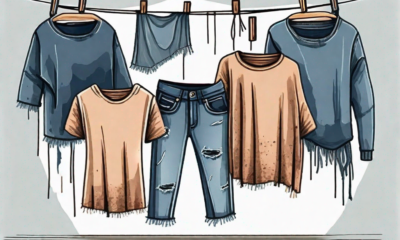
 FASHION7 days ago
FASHION7 days agoWhat Qualifies As Distressed Fashion?
-

 FASHION6 days ago
FASHION6 days agoSuit Up & Stand Out: How To Wear A Head-Turning Suit In 2024
-
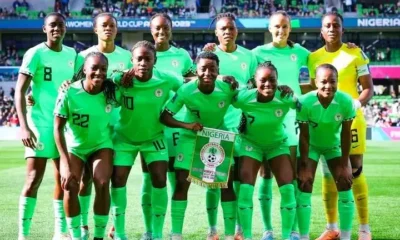
 SPORTS3 days ago
SPORTS3 days agoNigeria Vs Brazil: Time And Where To Watch The Super Falcons’ 1st 2024 Olympics Game
-

 HEALTHY LIVING5 days ago
HEALTHY LIVING5 days agoWhy Fibroids Come Back After Surgery
-

 OPINION6 days ago
OPINION6 days agoHow To Build Trust For A Stronger Relationship

